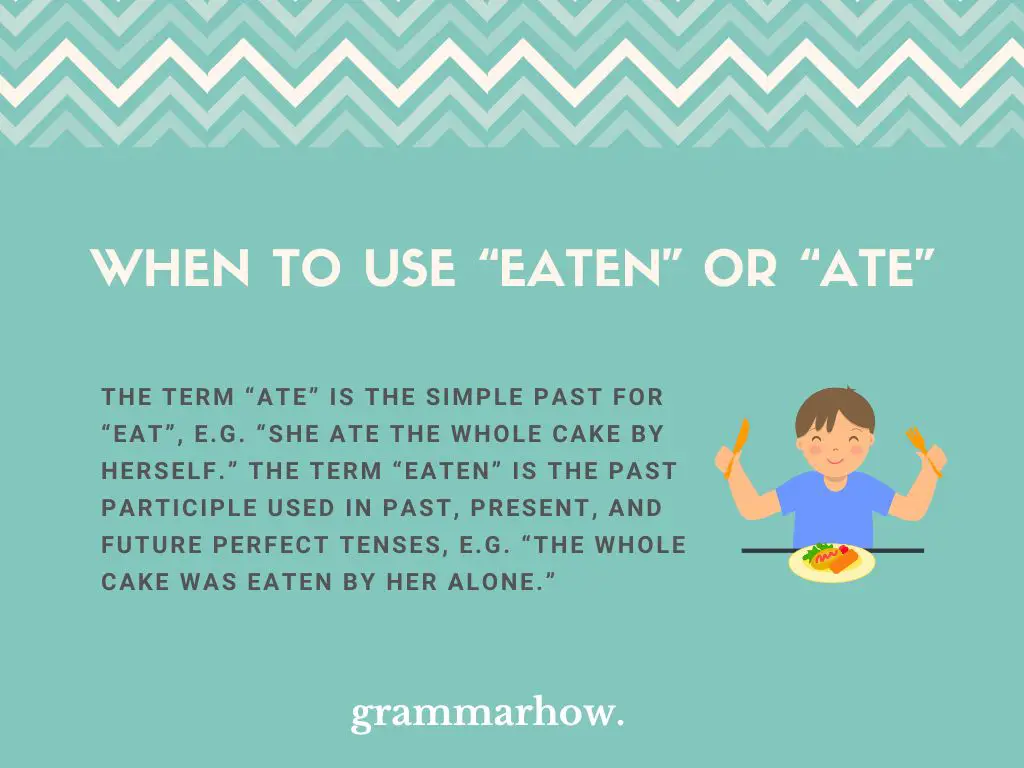The two forms of “eat”, which are “eaten” and “ate”, are often confused or misused by English learners. Therefore, this page informs when you should use the simple past “ate” vs when you should use the past participle “eaten.”
When to Use “Eaten” or “Ate”
The term “ate” is the simple past for “eat”, e.g. “She ate the whole cake by herself.” The term “eaten” is the past participle used in past, present, and future perfect tenses, e.g. “The whole cake was eaten by her alone.”

The simple past refers to events or periods that are finished and have no connection to the present. Consequently, the word “ate” can only be used in one tense, simple past active. In simple past passive sentences, you must use “eaten” rather than “ate.”
Here are some examples of simple past active and passive sentences:
- She ate the whole cake by herself. (Active)
- The whole cake was eaten by her alone. (Passive)
- We ate a lot of food at the buffet last night. (Active)
- A lot of food was eaten by us at the buffet last night. (Passive)
Furthermore, as well as being used in passive sentences, the word “eaten” is used in past, present, and future perfect sentences.
Here are some examples of each tense:
- We have eaten already, so we are not coming with you for dinner. – Present perfect
- He had eaten two pizzas before he started on his third. – Past perfect
- We will have eaten everything before they arrive unless we slow down. – Future perfect
- Pizza is eaten every day by him. – Present simple passive
- The pizza will be eaten by him sooner or later. – Future simple passive
Eaten
The word “eaten” is the past participle of the verb “eat”, and it is used in all non-continuous perfect tenses and in non-continuous passive sentences.
Sometimes there is some cross-over between “ate” and “eaten”, for example, when referring to what you ate “this morning.” Some people may use simple past because the morning is over, whilst others may use present perfect because it is still today and the morning belongs to today.
So you may hear the same thing being asked in several ways:
- Have you already eaten? (today)
- Have you eaten breakfast yet? (today)
- What did you eat for breakfast? (morning)
- Did you already eat breakfast? (morning)
Then in the replies, you may hear people switch between “ate” and “eaten.”
For example:
- Yes, I have already eaten today. I ate scrambled eggs.
- No, I haven’t eaten yet today.
- Yes, I ate scrambled eggs.
- No, I didn’t eat breakfast today because I was in a rush.
Here are some examples of eaten in other tenses:
- Have you eaten sushi before? – Present perfect
- Had you eaten sushi before you tried it last week? – Past perfect
- You will have eaten eight biscuits if you have another. I would stop if I were you. – Future perfect
Ate
The word “ate” is the simple past form of the verb “eat” and is only used in simple past active sentences.
The word “ate” cannot be combined with any form of the verb “have” and should always refer to events or periods that are finished with no connection to the present.
Here are some examples:
- I ate so much last night that I felt a little nauseous this morning.
- We ate the whole meal without saying a single word to each other.
- He ate at 7 am this morning but hasn’t eaten anything since.
- He ate up his dinner in record time because he was so hungry.
Conclusion
The word “ate” is the simple past form of “eat” and should only be used in active simple past sentences. The word “eaten” is the past participle of “eat” and can be used in past, present, and future perfect tenses.
Furthermore, “eaten” is used in all passive sentences that are not in continuous tenses, including simple past passive.

Martin holds a Master’s degree in Finance and International Business. He has six years of experience in professional communication with clients, executives, and colleagues. Furthermore, he has teaching experience from Aarhus University. Martin has been featured as an expert in communication and teaching on Forbes and Shopify. Read more about Martin here.
